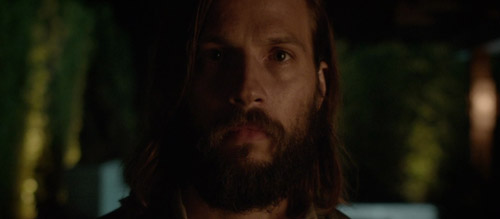The Invitation (2015) Review
This article was written exclusively for The Film Magazine by Sophia Patfield.
The Invitation (2015)
Director: Karyn Kusama
Screenwriters: Phil Hay and Matt Manfredi
Starring: Logan Marshall-Green, Emayatzy Corinealdi, Michiel Huisman, Tammy Blanchard
“I am different. I’m free. All that useless pain, it’s gone. It’s something anyone can have Will, and I want you to have it too.” Usually it would be lovely to hear of someone’s happiness and have that happiness wished to you… that is, of course, unless the “useless pain” is about your young son’s death and the person saying it to you is your ex-wife who disappeared for two years to join a cult in Mexico.
2015 psychological thriller The Invitation proves that you don’t need a cult following in order to be an incredible cult film. When Will (Logan Marshall-Green) and his new partner Kira (Emayatzy Corinealdi) get invited to a reunion by Will’s ex-wife Eden (Tammy Blanchard) and her new partner David (Michiel Huisman), Will’s main concern is how he will cope with returning to the house where his and Eden’s child had died two years before. More than the pain of past tortures however, he’s met with an awkward night of old friends, cults and mass murder steeped in all of the strong calling cards of the genre: blood, suspense and jump-scares.
As with any well made psychological thriller, like The Shining (1980), a major credit to this film is its sound design. With perfect awkward silences and use of white noise, the movie truly draws you into Will’s headspace and the tense atmosphere in the house right from the get go. The most notable scene to use this sound design comes at the beginning of an awkward dinner, with up-close chewing noises, muted voices and slowly heightening white noise. It becomes easy to associate with Will’s paranoia and mounting discomfort. The sound design even bleeds into the dialogue delivery, with many conversations becoming background fodder when Will becomes distracted by the “not quite right” goings on around the house, and creates the impeccable tension in a number of whispered scenes in which Will and Kira attempt to escape the horror-filled location. This incredible sound design, coupled with a minimal soundtrack composed by Theodore Shapiro (who has composed for films such as The Wolf of Wall Street (2013) and The Secret Life of Walter Mitty (2013))truly keeps you on the edge of your seat. Even the title sequence of the film, as Will and Kira drive up to the house, has hauntingly eerie music paired with disorientating visuals, a moment that helps to truly set the tone for the film and can be easily likened to the title sequence in the Oscar-winning horror Get Out (2017). These sounds and their delivery make the film an enjoyably tense watch, as every psych-thriller should be.
Due to the film being heavily reliant on tone rather than narrative, along with the sound design comes some astounding cinematography. Often utilising shadow more than highlights, cinematographer Bobby Shore, whose other works include Bang Bang Baby (2014) and Stuber (2019), shows just the right amount while keeping much in the dark. An early example of this comes in Sadie’s first appearance on screen; throughout the film, many moments with her are steeped in shadow to visualise the lack of clarity we have about her character, but when Will first sees her at the end of the corridor blocking the light from the room behind (and half naked), the audience are shown that the cinematographer has the concept of “shady person, shady shot” down to an art. As well as this, the film gets slowly darker as it progresses, because even though more light is being shed on the situation, the atmosphere begins to fill with fear and doubt – by the film’s climax the characters are in complete darkness, fighting for their lives.
On top of these amazing visuals and acoustics, the film’s emotionally difficult narrative adds another layer of immersion. The strange behaviour of everyone involved is slowly explained by the well placed flashbacks about the death of Will and Eden’s son, and the timings of each flashback are shown to be caused by a physical trigger such as Will remembering Eden’s suicide attempt when he goes to the sink during one particularly tense moment. This illustrates a depth of knowledge on the director’s part about trauma and how the mind works around it, even going so far as to reflect the types of reactions people often have to those with trauma through the way each of the friends act around the protagonists. Here, the story captivates and gets you emotionally involved, with the relatability upping the integrity of the film overall.
As a whole, The Invitation is a lesser known psych-thriller that absolutely deserves more love than it gets, its final reveal broadening the situation in a way similar to the ending of Us (2019). If you are a fan of Jordan Peele, then this film will be an exciting indie for you.
18/24
Written by Sophia Patfield


